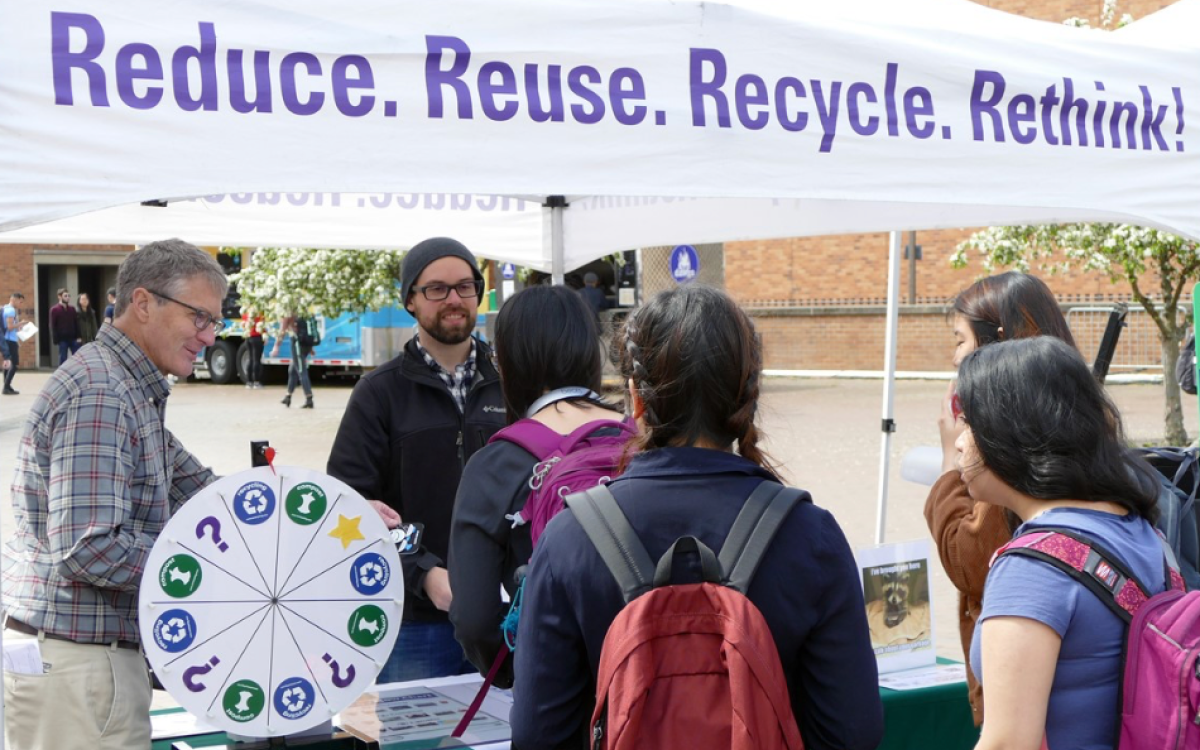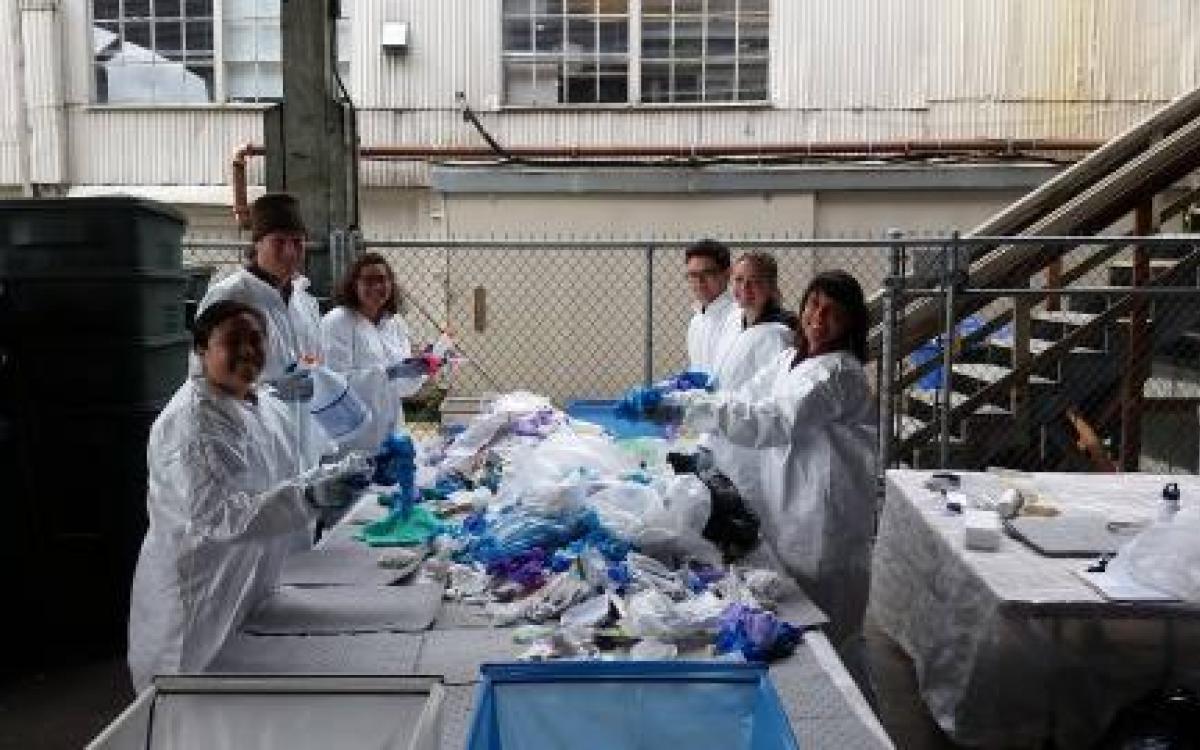At a glance
Labs account for over 20% of all space on campus. Nitrile lab gloves are a significant source of waste produced in labs across… Read full summary
- Funding received
- 2015-2016
- Large
- Awarded
- $2,000
- Funding partners
-
- Services and Activities Fee (SAF)
Labs account for over 20% of all space on campus. Nitrile lab gloves are a significant source of waste produced in labs across all departments. A recent waste audit concluded that gloves are the second largest source of waste in campus labs. UW Sustainability and UW Recycling propose a pilot program that would recycle used, non-hazardous nitrile lab gloves that are currently being sent to the landfill. The gloves would be collected then shipped back to their producer, Kimberly-Clark, where they would be recycled into products like park benches and chairs.
Labs account for over 20% of all space on campus. Nitrile lab gloves are a significant source of waste produced in labs across all departments. A recent waste audit concluded that gloves are the second largest source of waste in campus labs. UW Sustainability and UW Recycling propose a pilot program from April 2016 to June 2016 (Spring Quarter) that would recycle used, non-hazardous nitrile lab gloves that are currently being sent to the landfill. The gloves would be collected by campus labs from the Molecular Engineering and the Materials Science & Engineering departments and then shipped back to their producer, Kimberly-Clark, where they would be recycled into products like park benches and chairs.
Dalena Huynh
Project lead
- dhuynh93@uw.edu
- Affiliation
- Student
Chris Toman
Team member
- crtoman@uw.edu
- Affiliation
- Staff
Proposal
UW Sustainability and UW Recycling propose a pilot program from April 2016 to June 2016 (Spring Quarter) that would recycle used, non-hazardous nitrile lab gloves that are currently being sent to the landfill. The gloves would be collected by campus labs from the Molecular Engineering and the Materials Science & Engineering departments and then shipped back to their producer, Kimberly-Clark, where they would be recycled into products like park benches and chairs.
Environmental impact
Labs account for over 20% of all space on campus. Used nitrile lab gloves are a significant source of waste produced in University labs across all departments. Recently, a waste audit conducted from 20 DEOHS labs determined that used nitrile gloves account for 20% of the volume and 22% of the weight of waste generated from the labs. That represents the second and third largest source of lab waste, respectively. Only compostable materials (primarily paper towels) were a larger source of waste by both measures.
In response to the waste audit, UW Recycling piloted a lab-specific paper towel composting program with much success, leaving gloves as one of the largest sources of non-hazardous lab waste on campus, if not the largest.
Recently, Kimberly-Clark developed technology that breaks down nitrile gloves into pellets that can be recycled into plastic products, like waste and recycling containers, park benches, and chairs. This pilot program would have a significant environmental impact by diverting gloves from the landfill and reusing them to make new products.
Student leadership and involvement
UW Sustainability’s Green Labs Intern will coordinate with UW Recycling, UW Sustainability, and participating labs to develop and implement the pilot. Our recycling processing partner will be Kimberly Clark. The student will also assist in developing educational and outreach components of the program, collecting and analyzing data regarding rate of glove collection and program cost, and organizing the before and after waste audits.
Education, outreach, and behavior change
Outreach and education will target labs in the participating departments and will highlight the environmental benefits of recycling gloves. The program will educate, encourage, and promote the ease and benefits of diverting non-hazardous gloves from the landfill bin to a recycling bin. In addition, the program would educate lab users on which types of gloves are accepted for recycling (Kimberly-Clark brand only, nitrile, and non-hazardous)
Feasibility, accountability, and sustainability
Key internal and external stakeholders are aligned and ready to implement the lab glove recycling pilot. UW Sustainability has already reached out to labs in the Molecular Engineering and Materials Science & Engineering Departments. Lab Managers and building coordinators in both departments are excited and have agreed to participate. Kimberly-Clark’s RightCycle program has been going on for over 5 years. They have agreed to provide support in the form of best practices and are willing to connect us to other universities that have successfully implemented similar programs. In addition, UW Recycling has experience in a similar collection program for Styrofoam and has the operational expertise to ensure the program is a success.
Estimated project budget
We are requesting a budget of $2000, which will cover costs for shipping, signs, education, and trash sorting materials. The estimated cost to ship a pallet to Kimberly-Clark is between $400 and $600 each. We expect to ship two pallets over the course of the pilot.
Request amount and budget
Plans for financial longevity
Our request is to fund a pilot program with a definite end date. The pilot would be used to determine if it is financially and operationally sustainable for UW Recycling to expand the program and continue long term.
Problem statement
Labs account for over 20% of all space on campus, yet they produce tons of waste. Used nitrile lab gloves are a significant source of waste produced in University labs across all departments. Recently, a waste audit conducted from 20 DEOHS labs determined that used nitrile gloves account for 20% of the volume and 22% of the weight of waste generated from the labs. That represents the second and third largest source of lab waste, respectively. Only compostable materials (primarily paper towels) were a larger source of waste by both measures. In response to the waste audit, UW Recycling piloted a lab-specific paper towel composting program with much success, leaving gloves as one of the largest sources of non-hazardous lab waste on campus, if not the largest.
Recently, Kimberly-Clark developed technology that breaks down nitrile gloves into pellets that can be recycled into plastic products, like waste and recycling containers, park benches, and chairs. Gloves are being used and disposed daily. This pilot program would have a significant environmental impact by diverting gloves from the landfill and reusing them to make new products.
Measure the impacts
Before the labs begin recycling Kimberly-Clark nitrile gloves, a waste audit will be conducted for one week with each lab to establish pre-pilot waste levels. The gloves will be collected in their own bins. When the labs begin the recycling program, the rate of filling the pallets and numbers of gloves used will be monitored. By comparing how many gloves are being thrown away and how many gloves are being recycled, we will be able to measure how much waste is being diverted.
Education and outreach goals
Outreach and education will highlight the environmental benefits of recycling gloves. The program will educate, encourage, and promote the ease and benefits of diverting non-biohazardous gloves from the landfill bin to a recycling bin. In addition, the program would educate lab users on which types of gloves are accepted for recycling (Kimberly-Clark brand only, nitrile, and non-hazardous). There will be signage made to educate labs how to recycle the gloves.
UW Recycling and UW Sustainability will post on social media about our pilot program to the UW community about our vision of diverting glove waste. UW Sustainability will also feature a blog about the glove recycling program.
Once our pilot program complete, the results will be shared to the labs and UW community. If it is successful, the program could gradually expand. The program could be promoted through Green Lab Certification. Another possible method is to sign up small groups of labs in individual buildings, then eventually work with Departments to operationalize building-wide program.
Student involvement
UW Sustainability’s Green Labs Intern will coordinate with UW Recycling, UW Sustainability, and participating labs to develop and implement the pilot. Our recycling processing partner will be Kimberly Clark. The Green Labs Intern will also coordinate, solicit feedback, and collaborate with students working in the five participating labs to develop educational and outreach components of the program. The participating labs will include both graduate and undergraduate students who will be actively involved in the program design and will provide feedback throughout the pilot. In addition, the Green Labs Intern will organize waste audits from the labs before and after the pilot and will collect and analyze data regarding recycling rate and program cost. Student volunteers and students working in the labs will be recruited for the sorting.
A meeting will be scheduled with students from each lab to discuss their responsibilities during the program. Students from each of the five labs will be making signage for the glove recycling bins. The students will be responsible for making sure the gloves are recycled in the bin and fill the pallets when the glove bins are full.

